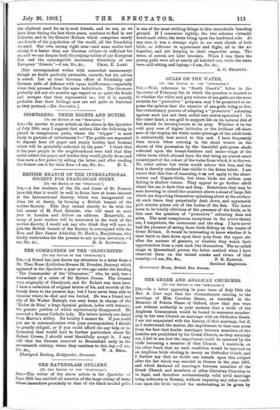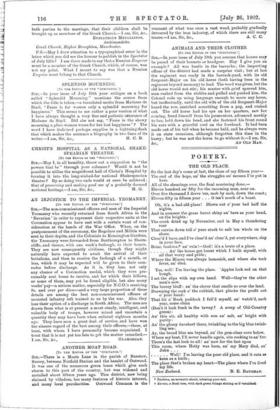THE GREEK AND ANGLICAN CHURCHES.
[TO TILE EDITOR OF THE "SPECTATOR."j Sut,—In a letter appearing in your issue of July 19th the Rev. A. Carr says that the circumstances relating to the marriage of Miss Caroline Skene, as recorded in the Memoirs of Felicia Skene of Oxford, show that you were not without authority in your surmise that a bride of the Anglican Communion would be bound to renounce member- ship in her own Church on marriage with an Orthodox Greek. I am not acquainted with the history of that marriage, but if, as I understand the matter, the impediment in that case arose from the fact that double marriages between members of two families are prohibited by the Greek Church, as they certainly are, I fail to see how the impediment could be removed by the bride becoming a member of that Church. I maintain, on the other hand, that no such condition would be imposed on an Anglican bride wishing to many an Orthodox Greek, and I further say that no doubt can remain upon this subject after the law which was enacted in Greece in the year 1861, and which declared all marriages between members of the Greek Church and members of other Christian Churches to be legal, and therefore ecclesiastically valid (civil marriage being unknown in Greece), without imposing any other condi- tion upon the bride beyond the undertaking, to be given by
both parties to the marriage, that their children shall be brought up as members of the Greek Church.—I am, Sir, &c., EIISTATRIITS METALLINOS, Archimandrite.
Greek Church, Higher Broughton, Manchester.
P.S.—May I draw attention to a typographical error• in the letter which you did me the honour to publish in the Spectator of July 12th ? I am there made to say that a Russian Emperor must be a member of the Greek Church, which, of course, was not my point. What I meant to say was that a Russian Empress must belong to that Church.







































 Previous page
Previous page